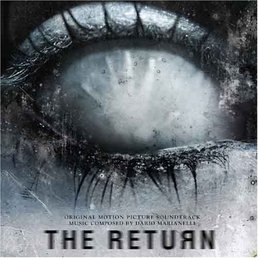
In his American horror debut, Italian-born, Academy Award-winning composer Dario Marianelli was brought on to score the film. Many of the horror genre’s best scores have been crafted by composers not traditionally associated with that genre, so I’m always intrigued when a new composer first tests these waters. John Williams and Jerry Goldsmith, master composers best known for their works outside of horror, are proof of this, while Hans Zimmer has made a few contributions that put him in the running too. Dario Marianelli, one of the brightest and most talented composers working today, accordingly sparked my interest when he decided to delve into the realm of horror after his work on Pride and Prejudice. While his work here does not showcase the brilliance that his later scores for Atonement, V for Vendetta, Agora, and even Jane Eyre would prove to the world that he possessed, The Return is nevertheless a solid yet somewhat sleepy effort.
There is little to condemn in Marianelli’s approach to scoring The Return. In fact, most of his score is a mellow, unusually harmonic and unexpectedly pleasant exercise in orchestral subtlety. Unfortunately though, such an approach does not lend itself well to making a strong impression, as much of The Return, albeit pretty and soothing, seems to gently breeze by. It only achieves memorability by the sheer pervasiveness of its cool, soothing themes. The first theme, a lullaby-like progression, is heard most prominently in "The Girl With Two Souls", "Present and Past", "Memory Lane", and "Sea Horses". It’s a delicate theme that’s very listenable, only vaguely connoting something awry in its two best renditions in "The Girl With Two Souls" and "Sea Horses". The mix of mellow piano over contemplative, lush strings calls to mind Christopher Young and, in fact, the entire package plays like one of his minor efforts. "Memory Lane" changes up the formula slightly with an acoustic guitar and light, Goldsmithian synth taps resulting in a pleasant combination.
The second theme, more weighty but still a subtle orchestral offering, is heard briefly to start in "Collision" and rehashed in a vague variant in "Terry Warms Up" before being given more thorough treatment in "Anna Dies" and "What Really Happened". The latter two cues are easily the best treatment of the theme on the score, with "Anna Dies" building it to its most dramatic proportions before "What Really Happened" strips it down to a softer piano rendition. Sans piano, the string progressions loosely evoke John Williams' Minority Report.
Aside from three blustery pieces in "Present and Past", "The Red Bar" and "Driving to La Salle" that draw from Marianelli’s first theme, the rest of The Return is a predictable exercise in the usual horror stingers, shrieking stings, and creepy mood-scapes. "A Close Shave", "The Other Woman", "Griff’s Garage", "Old Things", and "Cornered" all explore these territories without making much impression, the tapping Goldsmithian synths being the only recurring motif of note.
While it by no means stands as one of Dario Marianelli’s greater works, there’s little to fault him for in his score for The Return. What he has concocted here is quite passable and nothing more or less than the film deserves. Indeed, The Return is a very pleasant, soothing, and harmonious experience and, at just under 35 minutes, it’s by no means a chore to listen to. Quite sufficient for accompanying your brisk, rainy fall Sundays.
| A Few Recommended Tracks: "Anna Dies", "What Really Happened", "Sea Horses" Label: Lakeshore Records Availability: 16 track edition, including Patsy Cline's "Sweet Dreams (Of You)" | |

 RSS Feed
RSS Feed
